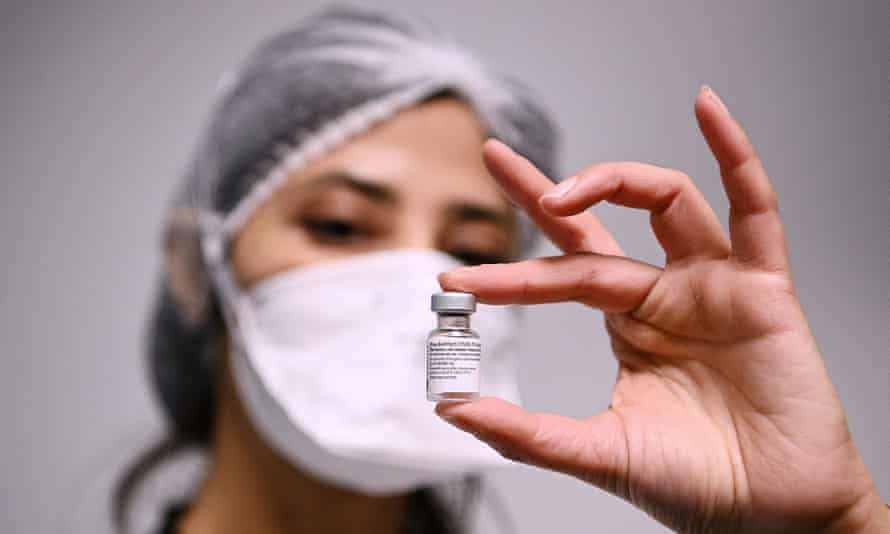Vaccine-makers around the world face shortages of vital components including large plastic growbags, according to the head of the firm that is manufacturing a quarter of the UK’s jab supply.
Stan Erck, the chief executive of Novavax – which makes the second vaccine to be grown and bottled entirely in Britain – told the Observer that the shortage of 2,000-litre bags in which the vaccine cells were grown was a significant hurdle for global supply.
His warning came as bag manufacturers revealed that some pharmaceutical firms were waiting up to 12 months for the sterile single-use disposable plastic containers, which are used to make medicines of all kinds, including the Pfizer, Moderna and Novavax Covid-19 vaccines.
But Erck and his British partners said they were confident they had enough suppliers to avoid disruption to the supply of Novavax. The vaccine is waiting for approval from the Medicines and Healthcare products Regulatory Agency (MHRA) but the first of 60 million doses ordered by the government are already in production in Teesside.
The Fujifilm Diosynth Biotechnologies factory began growing the first cells for the Novavax vaccine in Billingham, County Durham this month and in a few weeks they will fill the bioreactor bag, ready to be transported to GlaxoSmithKline’s plant at Barnard Castle to be put into vials for distribution.
“The first hurdle is showing it works and we don’t have that hurdle any more,” Erck said.
But he added there were others still to overcome. “There’s the media that the cells have to grow in,” Erck said. “You grow them in these 2,000-litre bags, which are in short supply. Then you pour it out and you have to filter it, and the filters are in short supply. The little things count.”
Novavax almost ran out of bags at one of its 20 factories earlier this year, but there had been no delays for the UK operation, according to Martin Meeson, global chief executive of Fujifilm Diosynth.
“We started working on our part of the supply chain in summer last year,” he said. “We had to accelerate some of the investment here, but the commitment we made last summer to start manufacturing in February has been fulfilled.”

Both Meeson and Erck said the UK’s vaccine taskforce had been helpful in sorting out supply issues so far, but other countries and other medical supplies might be affected.
ABEC makes bioreactor bags at two plants in the US and two in Fermoy and Kells in Ireland, and delivered six 4,000-litre bags to the Serum Institute in India last year for its Covid vaccines.
Brady Cole, vice-president of equipment solutions at ABEC, said: “We are hearing from our customer base of lead times that are pushing out to nine, 10, even 12 months to get bioreactor bags. We typically run out at 16 weeks to get a custom bioreactor bag out to a customer.” He said ABEC was still managing to fulfil orders at roughly that rate.
“The bag manufacturing capacity can’t meet demand right now,” he added. “And on the component side, the tubes and the instruments and so forth that also go into the bag assembly – those lead times are also starting to get stretched as well. But the biggest problem we see is it really is just the ability to get bags in a reasonable amount of time.”
ABEC expanded its factories last year and has now started making 6,000-litre bags, which are roughly the size of a minibus. Other firms including MilliporeSigma, part of German company Merck, have also been expanding their manufacturing facilities. American firm Thermo Fisher Scientific expects it will finish doubling its capacity this year.
The US government has also blocked exports of bags, filters and other components so it can supply more Pfizer vaccines for Americans. Adar Poonawalla, the chief executive of the Serum Institute of India, said the restrictions were likely to cause serious bottlenecks.
Novavax is hoping to avoid delays and “vaccine nationalism” by operating on four continents, with 20 facilities in nine countries.
“One year ago, we had exactly zero manufacturing capacity,” Erck said. “We’re self-sufficient. The two main things we need to do are done in the UK. And in the EU we have plants in Spain and the Czech Republic and fill-and-finish in Germany and the Netherlands.”
There was no need for vaccines to cross borders to fulfil contracts, he said.
The Oxford/AstraZeneca vaccine was hit by a delay to a delivery of 5 million doses from India and a problem with a batch made in Britain, and the company has been dragged into a lengthy row between the UK and the EU over vaccine exports.
This content first appear on the guardian

Muchas gracias. ?Como puedo iniciar sesion?